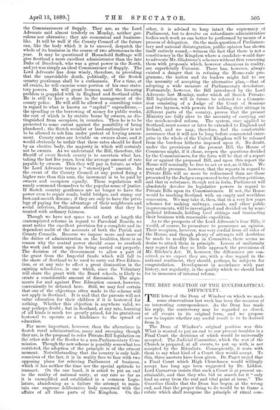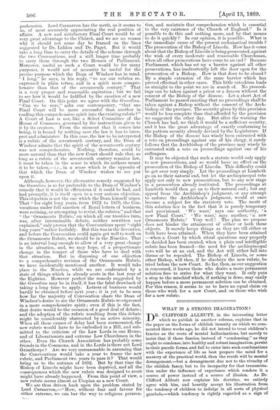THE BEST SOLUTION OF THE ECCLESIASTICAL DIFFICULTY. T HE letter of
the Dean of Windsor on which we made some observations last week has been the occasion of an interesting correspondence. As the Dean has made his reply, the controversy may be regarded as closed, at all events in its original form, and we propose now to inquire whether any useful result is to he derived from it.
The Dean of Windsor's original position was this. What is wanted to put an end to our present troubles is a Final Court the decisions of which would be universally accepted. The Judicial Committee, which the rest of the Church is prepared, at all events, to put up with, is not accepted by the Ritualists. Consequently, it rests with them to say what kind of a Court they would accept. To this, three answers have been given. Dr. Paget urged that a Final Court which High Churchmen would willingly accept has long ago been suggested by Dr. Liddon. Lord Carnarvon insists that such a Court is at present un- attainable, and that they who bid us search for it " only lead us away from the real and vital point at issue." The Guardian, thinks that the Dean has begun at the wrong end, and that the proper thing to do would be to frame a rubric which shall recognise the principle of ritual com- long as a rubric of the seventeenth century remains law, It may be objected that such a statute would only apply it must be taken in the sense in which its authors meant to new prosecutions, and so would have no effect on the it to be taken,—i.c., in a sense which is the opposite of prosecution of the Bishop of Lincoln. This difficulty could that which the Dean of Windsor wishes to see put be got over very simply. Let the proceedings at Lambeth upon it. go on to their natural end, but let the archiepiscopal veto Although, however, the alternative remedy suggested by apply not only to new prosecutions, but to any new stage the Guardian is so far preferable to the Dean of Windsor's in a prosecution already instituted. The proceedings at remedy that it would be efficacious if it could be had, and Lambeth would then go on to their natural end ; but any had promptly, it is itself open to a very serious objection. appeal from the Archbishop's judgment, or any attempt This objection is not the one which the Dean himself urges. to enforce the Archbishop's judgment, would at once That " for eight long years, from 1872 to 1879, the Con- become a subject for the statutory veto. The merit of vocations under full sanction of Royal letters of business, this solution lies in the fact that it is purely temporary were revising, or attempting to revise, the rubrics," and that and provisional. We want,' says one authority, a was, after interminable debate, neither rewritten nor Ornaments Rubric.' Very well ! The plan we propose explained," only proves that the Convocations spent " eight does not hinder the attainment of either or both these long years" rather foolishly. But this was in the Seventies, objects. It merely keeps things as they are till either or and before the Convocation could again get well to work on both have been attained. When they have been attained the Ornaments Rubric, we should be in the Nineties. That —when a Court by which ritual questions may properly is an interval long enough to allow of a very great change be decided has been created, when a plain and intelligible in the situation, and, we may hope, of a proportionate rubric has been framed—the need for the archiepiscopal change in the temper of those who have to deal with veto will be at an end, and the Act will either fall into that situation. But in disposing of one objection disuse or be repealed. The Bishop of Lincoln, or some to a comprehensive revision of the Ornaments Rubric, other Bishop, will then, if he disobeys the new rubric, be we have incidentally mentioned another. It would take tried before the new Court. So far, then, as our suggestion place in the Nineties, while we are confronted by a is concerned, it leaves those who desire a more permanent state of things which is already acute in the last year of solution free to strive for what they want. It only puts the Eighties. However perfect the remedy suggested by a stop to the mischief which, if nothing is done, may easily the Guardian may be in itself, it has the fatal drawback of happen before a more permanent solution can be obtained. taking a long time to apply. Letters of business would For this reason, it seems to us to have an equal claim on hardly be obtained before next year ; it is yet to be seen those who wish for a new Court, and on those who wish how far the majority of Convocation share the Dean of for a new rubric.
Windsor's desire to see the Ornaments Rubric re-expressed in a more comprehensive spirit ; even if this is the fact, that desire would be the occasion of a good deal of debate ; and the adoption of the rubric resulting from this debate might be considerably obstructed by an active minority. When all these causes of delay had been surmounted, the new rubric would have to be embodied in a Bill, and sub- mitted to the criticism of the Law Lords in one House, and of Liberationists and extreme Low Churchmen in the other. Even the Church Association has probably some friends in the Commons, and in the Lords is there not Lord Grimthorpe ? Are we very unreasonable in assuming that the Convocations would take a year to frame the new rubric, and Parliament two years to pass it? That would bring us to the autumn of 1892. But by that time the Bishop of Lincoln might have been deprived, and all the consequences which the new rubric was designed to avert might have already happened. From this point of view, a new rubric seems almost as Utopian as a new Court. We are thus driven back upon the problem stated by Lord Carnarvon,—" How, without fear and favour for either extreme, we can bar the way to religious persecu- prehension. Lord Carnarvon has the merit, as it seems to tion, and maintain that comprehension which is essential us, of most accurately appreciating the real position of to the very existence of the Church of England." Is it affairs. A new and satisfactory Final Court would be of possible to do this and nothing more, and by that means very great advantage to the Church, and we see no reason to do it quickly ? In our opinion, it is possible. What is why it should not some day be framed on the lines the immediate cause of the present ecclesiastical trouble ? suggested by Dr. Liddon and Dr. Paget. But it would The prosecution of the Bishop of Lincoln. How has it come take a long time to carry the details of the scheme through about that the Bishop of Lincoln is being prosecuted, against the two Convocations, and a still longer time probably the wish of every moderate and reasonable Churchman, to carry them through the two Houses of Parliament. when all other prosecutions have come to an end ? Because Moreover, useful as such a Court would be for many Parliament, which has set up a barrier against all other purposes, it would not of necessity be useful for the prosecutions, has inadvertently left the door open for the precise purpose which the Dean of Windsor has in mind. prosecution of a Bishop. How is that door to be closed ? " I long," he says, in his reply, " to see our rubrics re- By a simple extension of the same barrier which has expressed in plain teems, and in a spirit more compre- proved effectual in other cases. This little catechism leads hensive than that of the seventeenth century." That us straight to the point we are in search of. No proceed- is a very proper and reasonable aspiration ; but we fail ings can be taken against a priest or a deacon without the to see how it would be fulfilled by the creation of a new consent of the Bishop of the diocese. Let a short Act of Final Court. On this point we agree with the Guardian. Parliament be passed enacting that no proceedings shall be " Can we be sure," asks our contemporary, "that one taken against a Bishop without the consent of the Arch- Final Court will be more successful than another in bishop of the province. The security given by this provision reading this comprehensive spirit into the existing rubric ?" would be less complete than that afforded by the provision A Court of Law is not, like a Select Committee of the we suggested the other day. But after the warning the House of Commons, governed by the instructions given to Church has had, we think it would be a sufficient security, it by its creators. From the moment that it comes into and it has the great advantage of exactly conforming to being, it is bound by nothing save the law it has to inter- the pattern security already devised by the Legislature. If pret and administer. In this case, the law to be interpreted the Bishop of the diocese has wisely been entrusted with is a rubric of the seventeenth century, and the Dean of a veto on proceedings against one of his clergy, it surely Windsor admits that the spirit of the seventeenth century follows that the Archbishop of the province may wisely be was not comprehensive. Nothing, therefore, could be entrusted with a veto on proceedings against one of his more natural than that the new Court should rule that, so suffragans.
" the Ornaments Rubric,' on which all our troubles turn, new Final Court.' We want,' says another, a new



































 Previous page
Previous page